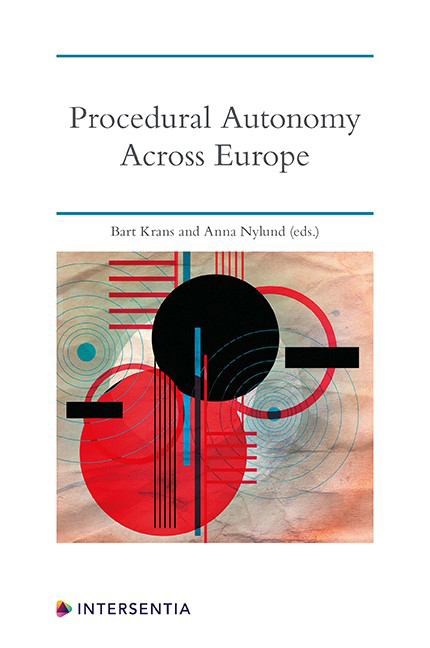Book contents
- Frontmatter
- Preface
- Contents
- Table of Cases
- List of Authors
- Aspects of Procedural Autonomy
- Procedural Autonomy and Belgian Civil Procedure Law: A Turbulent Cohabitation
- The English Approach to Procedural Autonomy
- The Finnish Way of Understanding Procedural Autonomy: A Practical Approach to Implementing EU Civil Procedural Law
- A German Perspective on the Waning Procedural Autonomy in Civil Matters: Who is Afraid of European Civil Procedure?
- Procedural Autonomy in the Netherlands: A Fading Relic?
- Procedural Autonomy, the EEA Agreement and Norwegian Law: The Art of Bridging a Gap and Maintaining it Too
- A Polish Perspective on Collective Civil Proceedings: Reluctance to Follow EU Recommendations?
- Procedural Autonomy between EU Law and the Slovenian Law of Civil Procedure
- Autonomy of the Spanish Legislator in the Regulation of Procedural Law: The Borders of European Case Law
- Procedural Autonomy in Sweden: Is Materielle Prozessleitung the Answer?
- Comparative Insights on Procedural Autonomy
- Index
- ABOUT THE EDITORS
Procedural Autonomy and Belgian Civil Procedure Law: A Turbulent Cohabitation
Published online by Cambridge University Press: 30 April 2020
- Frontmatter
- Preface
- Contents
- Table of Cases
- List of Authors
- Aspects of Procedural Autonomy
- Procedural Autonomy and Belgian Civil Procedure Law: A Turbulent Cohabitation
- The English Approach to Procedural Autonomy
- The Finnish Way of Understanding Procedural Autonomy: A Practical Approach to Implementing EU Civil Procedural Law
- A German Perspective on the Waning Procedural Autonomy in Civil Matters: Who is Afraid of European Civil Procedure?
- Procedural Autonomy in the Netherlands: A Fading Relic?
- Procedural Autonomy, the EEA Agreement and Norwegian Law: The Art of Bridging a Gap and Maintaining it Too
- A Polish Perspective on Collective Civil Proceedings: Reluctance to Follow EU Recommendations?
- Procedural Autonomy between EU Law and the Slovenian Law of Civil Procedure
- Autonomy of the Spanish Legislator in the Regulation of Procedural Law: The Borders of European Case Law
- Procedural Autonomy in Sweden: Is Materielle Prozessleitung the Answer?
- Comparative Insights on Procedural Autonomy
- Index
- ABOUT THE EDITORS
Summary
INTRODUCTION
A thorough knowledge of and familiarity with each other are prerequisites for any well-balanced relationship. Cohabitation in a multi-layered legal system, with complex interrelations between its different layers, is not always a walk in the park. Member States have to learn to live with their shrinking procedural autonomy and the way this affects their national legal system, due to the varying impact of EU (case) law, fundamental legal principles and even soft law instruments.
Against this background of procedural autonomy, two topics are analysed which are particularly relevant from a Belgian viewpoint. The first reveals, in the wake of a recent CJEU judgment, the urgent need to rethink profoundly and deliberate the Belgian rules on litigation costs. The second topic confronts us with the phenomenon of spontaneous harmonisation. Transposing a rule written for cross-border litigation in the domestic context has to be applauded. But the transposition could have been done in a much more effective way.
THE RECOVERABILITY OF COSTS OF LAWYERS’ FEES AND COSTS OF TECHNICAL ADVISERS AFTER UNITED VIDEO PROPERTIES INC. v. TELENET NV (C-57/15)
RECOVERABILITY OF LAWYERS’ FEES AND EXPENSES IN BELGIUM: ANTECEDENTS OF THE CASE
EU regulations and directives have repercussions on a vast list of procedural topics. Litigation costs is one of them. Recent Belgian case law offers an example of serious friction with national rules, caused by Article 14 of the IP Rights Enforcement Directive. This provision states:
Member States shall ensure that reasonable and proportionate legal costs and other expenses incurred by the successful party shall, as a general rule, be borne by the unsuccessful party, unless equity does not allow this.
In its Realchemie judgment the CJEU reminded that this provision aims to strengthen the level of protection of intellectual property, by avoiding the situation in which an injured party is deterred from bringing legal proceedings in order to protect his rights.
Although some have argued that also Article 14 of the Directive required implementation because of the nature of IP cases, especially the complexity of the legal and technical issues at stake which makes, e.g. patent litigation quite expensive, the Belgian legislator did not transpose this provision.
- Type
- Chapter
- Information
- Procedural Autonomy Across Europe , pp. 13 - 36Publisher: IntersentiaPrint publication year: 2020



